- Home
- Jessie Haas
Uncle Daney's Way Page 2
Uncle Daney's Way Read online
Page 2
When Uncle Daney had unpacked, the stall didn’t seem any fuller. He didn’t own anything, as far as Cole could tell, except Nip, and work clothes, and a lot of long underwear.
The rest of the weekend Cole and Pop cut wood, and the only thing different was that when Cole looked up, there was a big red horse out among the junipers. Every time Cole saw Nip, he felt a little jolt of surprise. It was the same surprise he felt each time he saw Uncle Daney in the wheelchair, sitting in the big doorway of the barn. The wheelchair was what he’d expected, but Uncle Daney was not.
They all ate supper together on Sunday night. Lingering over dessert, when Pop had gone back to the house, Cole learned surprising things. He’d known Mom was the one who most wanted them to own their own land, but he hadn’t known why.
“I watched my father work all his life at a job he hated,” Mom told Uncle Daney. “I didn’t want Bill getting bitter like Dad did.”
Cole learned that Mom was worried because now they had their own land it seemed as if Pop worked harder than ever.
He learned that she was worried about him. “Even Cole works too hard,” she said. “And he hasn’t made friends here.”
What about you? Cole thought. None of them had made friends yet, and Mom spent all day sitting in the trailer, sewing doll dresses for a nearby factory to make a little extra money.
“I’m not complaining,” Mom said. “It’s just nice having family around to talk to.”
“Never spent much time with family,” Uncle Daney said thoughtfully. “Hit out for the log camps when I was sixteen.” To Cole he didn’t sound regretful. He sounded pleased with where he’d been and pleased with where he was now.
“What was it like, Uncle Daney?” Mom asked. She looked like a little girl asking for a story.
Uncle Daney sat thinking. His eyes got larger and brighter, but secret-looking, as if he had much he couldn’t tell. After a minute he said, “Cole, there’s an envelope in that table by the bed. Get it for me?”
Cole brought the envelope. It was brown and cracked, and inside he could see a few curled black-and-white snapshots. Uncle Daney took them out and handed them to Mom. “This is me,” he said. “Young feller that worked with us one summer sent ’em to me. That was back in—’thirty-nine, I guess.”
Cole looked over Mom’s shoulder at the pictures.
An enormous load of logs, pulled by six horses. High on the logs perched a thin teenaged boy, his hair flying straight up like a tongue of flame.
A bunkhouse, dirty-looking in the black and white of the picture. There was deeply rutted mud in front of the door and a white dog scratching itself. Three men and the thin boy sat on the step playing cards.
Two huge men and the boy with the wild hair, dancing some kind of jig for the camera. The men danced heavily, and their grins were bashful. The boy, between them, had linked his arms through theirs, and he was kicking up his heels. His legs looked so loose and limber Cole almost expected to see them move. The other two were stopped in time, but the little one was still dancing. Cole kept himself from looking across the table at Uncle Daney in the wheelchair.
Mom looked up from the pictures. “You had fun, didn’t you? I always thought you must have.”
Uncle Daney’s eyes gleamed. He loosened his teeth—both sets—rotated them in his mouth, and settled them into place again. “Ay-yup,” he said. “I did.”
On Monday, when Cole got off the bus, Uncle Daney was sitting alone outside his stall, looking at the big heap of leather that Stewie had dropped there. He waved, but not as if he expected Cole to come over.
Normally Cole would have gone inside for a glass of milk and a snack, and then, with nothing else to do, he’d have hiked up to the top of the Hogback. But it didn’t seem right to walk past Uncle Daney without stopping to say hello.
“What you doing?”
“Figurin’,” said Uncle Daney. He didn’t look up.
“Figuring what?”
“Ropes. Pulleys. Know anything about pulleys?” He glanced up in his sharp way, and Cole nodded cautiously.
“Got any?”
“There’s some around,” Cole admitted. “How big?”
“How big’d they need to be to lift this harness up there?” Uncle Daney pointed to the rafters that crossed above the aisle.
Now Cole knew he was being strung along, but he couldn’t help asking, “What you want to do that for?”
“You don’t think I’m in any shape to lift a harness by myself, do you?” Uncle Daney cackled. “Heh! Never was big enough! Neither are you.”
“But what do you want to lift it for?”
“You wouldn’t be a bad-lookin’ boy if you’d quit aglow-erin’!” Uncle Daney said. “How am I gonna get the danged thing onto Nip if I don’t lift it?”
The job took most of the week, and all the pulleys Cole could find, in the toolboxes, from the old block and tackle, and rusting in back corners of the barn. For rope, Uncle Daney braided baling twine; all day long, Cole thought. Every afternoon when Cole got off the bus, Uncle Daney had what seemed like another fifty feet, neatly coiled beside his chair.
Friday, when he got home, the visiting nurse was there. Mom had been dreading that. “Even way out here,” she said, “you can’t stick an old man out in a barn without somebody getting upset about it!”
But the visiting nurse was charmed. “It’s ideal,” she said to Mom. “So many old people want the independence he has. It’s so hard never being alone and always acting like a guest.” As she got into her car, she added, “But if I were you, I’d move the whole family out there! What a-great house that barn would make!”
“Someday we may do that,” Mom said.
When the nurse was gone, Cole laid the harness out in the aisle. It was heavy and stiff, and he had to haul instead of lift it.
Uncle Daney wheeled all the way around the harness, scratching thoughtfully at the stubble on his chin. Then he showed Cole where to attach the ropes and how to tie quick-release knots, which came loose with one tug. “Think that’ll do it,” he said. “Back in the camps I had it rigged so’s I could do it anywhere there was a good strong tree limb. Didn’t often have a barn as good as this to work in.”
Cole got out the tall stepladder and threaded all the ropes through the pulleys, brought them together, and spliced them into the main rope, which ran down to a cleat near the door.
When they were ready, Uncle Daney wheeled himself slowly out by the door. He took hold of the main rope and pulled it, hand over hand. The huge, heavy harness lifted up silently. The ropes spread it wide, so that Cole could almost see a horse shape within it. Uncle Daney hoisted it straight to the beams. Then he lowered it again, to the height of Nip’s back.
“Works pretty slick,” he said to Cole. “Want to try her?”
Cole was amazed at how easy it was. The harness seemed to weigh nothing at all.
He was just wrapping the rope around the cleat when Mom came out, bringing Uncle Daney’s supper. She stared up at the beams, and Uncle Daney said, “Got that danged old thing hung up out of your way, Lou. Mmm, that smells good!”
On the weekend Pop tilled the pea patch. He had a huge, rusty old Rototiller that had been in the barn when they bought this place. It was as noisy as the chain saw, and it shook Pop all over, so hard that his hat fell off. Uncle Daney came out to watch. Once, after the tiller had stalled, Cole heard Pop ask, “That horse know how to pull a plow, Daney?”
“He never has,” said Uncle Daney, “but that don’t mean we can’t teach him.”
But that was all Uncle Daney said about Nip all weekend. He wheeled out to the gate once. Nip came and leaned over the bars, and Uncle Daney spent half an hour with him. After Uncle Daney had come back, Cole took a rake and smoothed the humps of grass near the gate and pushed the stones aside.
“Glad you did that, Cole,” Pop said later. “He seems pretty attached to that horse. Like him to be able to spend time with him as long as he’s here.”
; “Is Uncle Daney going somewhere?”
“No, but the horse has to,” Pop said regretfully. “We’ve got just about enough grass for the one beef critter.”
“We could feed him hay,” Cole said. He hadn’t socialized with Nip yet, but he liked the way the horse looked, big and blond among the dark junipers.
“Hay costs,” said Pop. “Even with Daney giving us what’s left of his government check, there’s still hospital bills, and fixing his place up set me back quite a little. I don’t see how I can do it, Cole.”
Cole didn’t see either when Pop put it that way. But he knew that giving up Nip wasn’t in Uncle Daney’s plans. For a minute he thought he should tell Pop about the harness in the rafters. Then he decided it was better just to wait and see.
CHAPTER THREE
ON MONDAY AFTERNOON, when Cole got off the bus, Uncle Daney was waiting. Nip’s halter was in his hand.
“Open the gate for me, Cole,” he said, crunching slowly toward the pasture.
Suddenly Cole felt impatient. “Want to get there a little quicker?” he asked, and without waiting for an answer, he grabbed the two handles of the wheelchair and started running. Uncle Daney was heavier than he looked, and Cole had to push hard. The wheelchair bumped over a stone, and Uncle Daney let out a yelp. Then he started to cackle, high-pitched and breathless.
“Wheee! Chariot ride! Heh-heh-heh!” It took him a minute, at the gate, to catch his breath. Then he whistled once, between his teeth. Out among the junipers Nip lifted his head and stared.
Uncle Daney whistled again. Slowly Nip turned and picked his way through the junipers toward them.
“Head down,” Uncle Daney told him. He buckled on the halter and wheeled himself out through the gate.
Back at the barn Uncle Daney led Nip inside. He turned him around to face out the big door, and he dropped the rope.
“Don’t you want to tie him?” Cole asked.
“He’s ground-tied. He won’t move till I pick up that rope.”
“He can move any time he wants to!” Cole said.
“That may be true, but he don’t know it. That’s trainin’, boy. That’s how you handle a horse. Muscle won’t get you nowhere, even if you’re as big as Stewie. Now get me them brushes, there in the grain bag. Always brush a horse before you put leather on him.” Uncle Daney paused and cackled. “Course, things being what they are, you’ll have to do it. I can’t reach much farther than his belly.”
Even Cole couldn’t reach everywhere. He had to stand on a crate to brush Nip’s broad back.
Cole had seen big horses like this at the pulling contests. They pranced to the stoneboat—a heavy prance, harness jingling. They turned; they lunged forward, sometimes even before they were hitched. It could take three big men, all working hard, to hitch a team to a stoneboat.
But Nip didn’t seem to be like that, at least not now. He stood quietly, staring straight ahead in his mild, thoughtful way, while Cole brushed his back and sides and Uncle Daney brushed his legs.
“Now his feet. Always check a horse’s feet before you use him.”
Were they going to use Nip? And for what?
And how on earth was Cole supposed to pick up those feet, which were bigger than dinner plates?
“Give a little pull on the long hair there,” Uncle Daney said, “so he knows which foot you want. And say, ‘Give me your foot.’”
Before Cole could move, Nip lifted one front foot and stood holding it up.
Uncle Daney wheeled a little closer. “Looks nice and clean,” he said. “Do the rest, Cole, and I’ll keep quiet. He’ll need to get used to you talkin’ to him.”
A sudden shiver went down Cole’s back. He had a feeling he was getting into something, maybe deeper than he wanted. Or was it that he’d gotten in already, without realizing? He moved to Nip’s back leg and said, “Give me your foot, Nip.”
Nip turned his head and looked back at Cole.
“Give me your foot.”
Nip turned to look straight ahead again. In a slow, patient way, he picked up his back foot.
“Hey! He understood!”
“Course he understood,” said Uncle Daney. “Is his foot clean?”
When Cole had checked all of Nip’s feet, it was time to try lowering the harness.
“You let me do it,” Uncle Daney said, “and you stay back. It’s been awhile; this might startle him.”
“I could get out of the way quicker than you,” said Cole.
“Maybe so, but he don’t know you. Step back.” Uncle Daney wheeled up to the cleat and unwound the rope. “Easy, Nip,” he said. “Easy, Nip.” His voice was gentle and calming, as the harness started to come down.
Suddenly Nip saw it. He threw up his head, the quickest move Cole had yet seen him make, and he started to take a step.
“Whoa!”
Uncle Daney’s voice was like a steel bar, dropped in front of Nip’s chest. The big horse stopped abruptly, still looking tense, but as if moving were impossible.
“Good boy!” The harness settled on Nip’s back, and Uncle Daney let it rest on him a minute. Then he said, “Easy, Nip,” and lifted it. Up and down he moved the harness, until Nip relaxed and lowered his head.
“All right, that’s enough for today.” Uncle Daney said. “Tomorrow we’ll drive him.”
The next day, when Cole got home, Uncle Daney had Nip out in the yard.
“I’ll be right there!” Cole yelled, running toward the trailer.
Inside, Mom looked up from her sewing. “Cookies on the table,” she said. “Take some out to your uncle Daney.”
“How’d he get Nip out?” Cole asked.
“He just went out and did it,” said Mom. “And then he spent all day sitting out there with him, beside the road. He said he wanted to give Nip some better grass, but see if you can find out what he’s up to.”
But Uncle Daney gave Cole no chance to ask questions. It was time to learn about harnessing. Cole stood on a box to slide the big leather collar over Nip’s head and settle it on his shoulders. He lowered the harness. He put the long, curved wooden pieces with the brass knobs on the end, the hames, into the grooves on the collar, and buckled them tight. He fastened the buckles on the harness. Then Uncle Daney handed him the bridle.
“Tell him, ‘Head down,’” said Uncle Daney, and before Cole could say anything, Nip lowered his head. “Hold the top of the bridle in your right hand and the bit in your left,” Uncle Daney said, “and stick your thumb in the corner of his mouth. Tell him, ‘Open up.’”
Nip opened his jaws. There was a slight sound as he did, and Cole saw the horse’s huge yellow teeth. They passed his fingers and closed around the bit, and then Nip settled it back in his mouth, with the same motion Uncle Daney used when he put in his teeth.
“Get his ears in,” Uncle Daney advised, and quickly Cole stuffed them through the openings in the top of the bridle.
“Good,” said Uncle Daney. “Now we can start teachin’ you to drive.”
“Where are the reins?” Cole asked, looking around. He didn’t see any more leather anywhere. All of it seemed to be on Nip.
“I don’t use reins on him,” Uncle Daney said. “Don’t know why I bother with the bridle. Looks, I guess.”
“But—”
“We’ll take him out on the driveway,” said Uncle Daney, wheeling himself over the threshold onto the gravel. “Nip, walk.” Slowly, foot by heavy foot, Nip followed Uncle Daney out onto the driveway.
When Uncle Daney was in the widest part, between the barn and the trailer, he stopped his chair. Nip hesitated.
“Walk on, Nip.”
Nip put his ears out to the sides, as if he was of two minds about this, but he kept on walking. He was heading straight toward the plowed and seeded pea patch. Cole opened his mouth to say something, but he kept the words from coming out. He saw his mother, sewing by the window, look up. Then she vanished, and a moment later she was looking out the door.
When Nip was abou
t ten feet from the pea patch, Uncle Daney said quietly, “Nip, haw.”
Nip turned, and when he had made a perfect right angle, Uncle Daney said, “Walk on.” Nip started walking straight again, heading down the driveway.
“You see?” said Uncle Daney. “’Twas horses like him made a logger out of me. I wan’t never the right size to be one on my own. Haw, Nip. Now walk on.” Uncle Daney drove Nip around him in a perfect square, and then he said, “Whoa.” Nip stopped, once again as if a bar had dropped in front of him. “Now you take the reins,” Uncle Daney said, looking up at Cole.
Cole waited.
“You remember the words.” Uncle Daney dropped his voice. “‘Walk’ means forward, ‘haw’ is left, ‘gee’ is right, and ‘whoa’ is whoa. Take him in a square, like I done.”
Cole swallowed. “All right. Nip, walk.”
Nip looked around at Cole and Uncle Daney, his ears pricked gently forward.
“Again,” said Uncle Daney.
“Nip, walk.”
This time Cole’s voice sounded firmer. Nip gave a big sigh and started walking forward. He was heading straight toward the pea patch again, and getting closer.
“Um—gee, Nip! Gee! I mean—” Nip promptly and obligingly turned right, straight toward the trailer. He stopped with his head over the railing around the little front stoop.
Mom opened the door and came out. “Hello, Nip,” she said softly. Nip pricked his ears at her. “Uncle Daney, I have an apple core. Can he have it?”
“Go ahead and give it to him,” Uncle Daney said. “Now, Cole, when she finishes, you’ll tell him, ‘Back up.’ When he’s clear of the railing, you’ll gee him again, and then you’ll straighten him out.” He didn’t look up, and Cole felt the red gradually going out of his face. He waited until Nip was through crunching the apple core, and then he said, “Nip, back up!” It went as easily as it had sounded.
“It’s like a remote-controlled race car,” Cole said when he had driven Nip in four or five squares around them.

 Chase
Chase The Sixth Sense
The Sixth Sense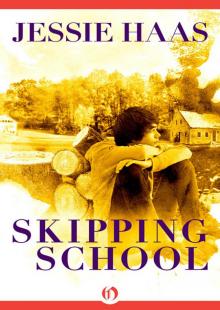 Skipping School
Skipping School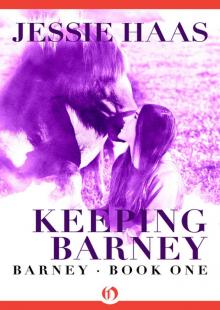 Keeping Barney
Keeping Barney Unbroken
Unbroken Westminster West
Westminster West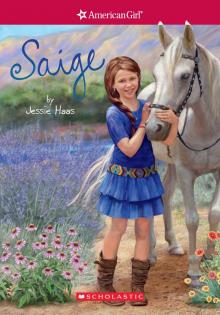 Saige
Saige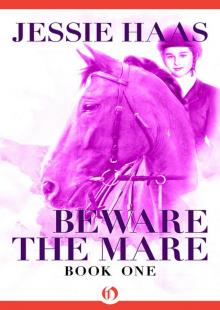 Beware the Mare
Beware the Mare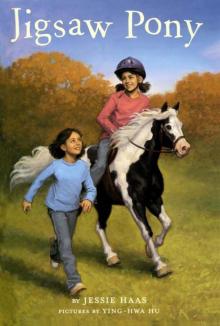 Jigsaw Pony
Jigsaw Pony Rescue
Rescue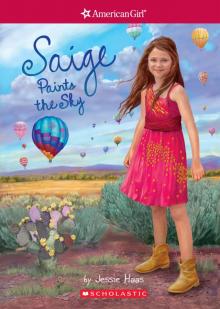 Saige Paints the Sky
Saige Paints the Sky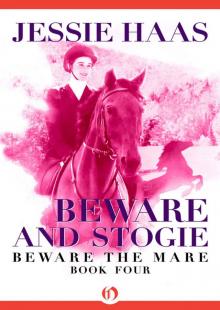 Beware and Stogie
Beware and Stogie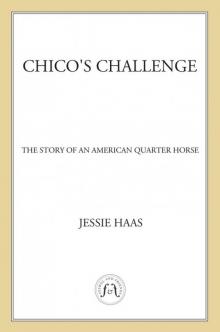 Chico's Challenge
Chico's Challenge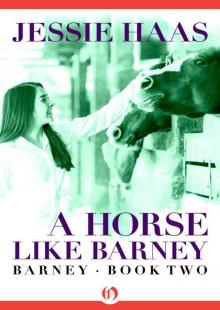 A Horse like Barney
A Horse like Barney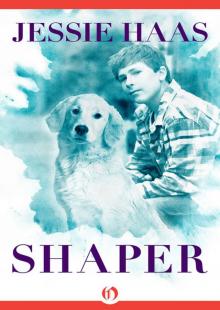 Shaper
Shaper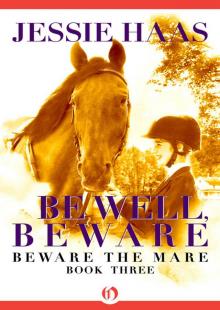 Be Well, Beware
Be Well, Beware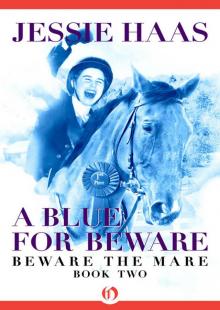 A Blue for Beware
A Blue for Beware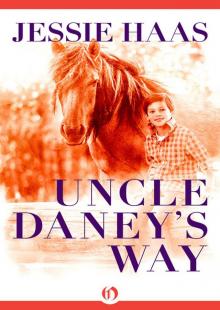 Uncle Daney's Way
Uncle Daney's Way